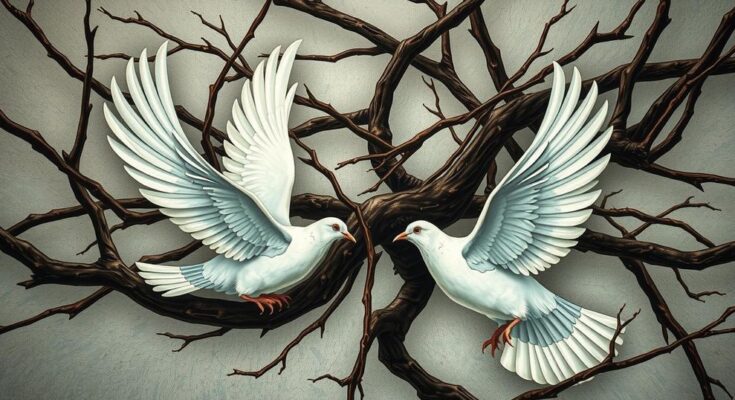Rwandan President Paul Kagame has sharply criticized South African President Cyril Ramaphosa over allegations of Rwandan support for M23 rebels in the Democratic Republic of Congo. Following the deaths of South African soldiers amid fighting, Kagame accused Ramaphosa of lying and warned of possible confrontation. Diplomatic tensions arise against a backdrop of regional conflict rooted in the fallout from the Rwandan genocide.
Rwandan President Paul Kagame has responded sharply to accusations from South African President Cyril Ramaphosa regarding Rwanda’s support for the M23 rebels in the Democratic Republic of Congo (DRC). Following Ramaphosa’s claims, which were made in light of recent clashes that led to the deaths of 13 South African soldiers, Kagame accused him of “lying” and suggested that Rwanda is prepared for possible confrontation.
Furthermore, Ramaphosa directly attributed the casualties to the M23 militia, which he referred to as a “Rwandan Defense Force militia.” In a statement, South African Defense Minister Angie Motshekga warned the M23 fighters that any fire directed at their troops would be considered a declaration of war, intensifying tensions between the two nations.
The diplomatic conflict arises as South Africa maintains a troop presence in the DRC under both United Nations and Southern African Development Community (SADC) missions aimed at supporting local forces against rebel groups. Ramaphosa emphasized South Africa’s advocacy for an immediate ceasefire and the cessation of all support for M23, echoing sentiments expressed in an African Union meeting regarding the escalating situation.
Kagame challenged Ramaphosa’s characterization of the Rwandan Defense Force, insisting they are not a militia and criticizing South Africa’s portrayal of its troops as peacekeepers, arguing they are engaged in offensive operations. Kagame noted prior communications with Ramaphosa regarding South Africa’s involvement in eastern Congo and insisted on Rwanda’s right to respond should confrontational threats persist.
The eastern DRC, rich in minerals and bordering Rwanda, has faced over three decades of conflict, significantly fueled by the aftermath of the 1994 Rwandan genocide. The Rwandan government claims that remnants of genocide perpetrators pose a security threat as they escaped to the DRC, with Kigali accused of seeking to control the area’s mineral resources. The Congolese government has publicly criticized Rwanda for its alleged military engagement in the region, suggesting ulterior motives linked to resource acquisition.
The ongoing tensions between South Africa and Rwanda center around the issues in the eastern Democratic Republic of Congo, where various rebel groups, including the M23, have been active for many years. The region has been embroiled in conflict since the Rwandan genocide in 1994, with the DRC being a haven for those fleeing accountability. The accusations of external military support by Rwanda for these rebel groups complicate peacekeeping efforts and highlight the intricate relationship between resource wealth and regional security.
The war of words between South Africa and Rwanda highlights the complexities of the situation in the eastern DRC, where international involvement and local conflict dynamics intersect. As both leaders issue strong statements, the potential for increased military engagement risks exacerbating an already volatile scenario. The ongoing conflict challenges peacekeeping operations and raises questions regarding the motives behind foreign interventions in this mineral-rich region.
Original Source: www.voanews.com




